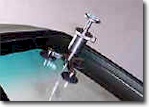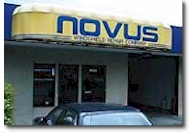|
|
|
|
|||
|
|
|
||||
| Windshield Repair | |||||
|
|
Should You Repair It or Replace It?
WHACK! A rock just bounced off your windshield, leaving a dime-sized chip right in front of your nose. Not only does it obstruct your view, but if it's like other rock chips you've received, it'll soon sprout cracks that spread like wildfire. There was a time when a chip or crack in your windshield meant certain replacement. That's no longer the case. Modern technology makes it possible to repair windshields that would have previously been scrapped. Not only does this save your windshield, it also saves you money. But be aware that even the most advanced glass repair techniques have their limits. So if your windshield is severely damaged, new glass may still be in your future. Do I have to replace my windshield or can it be
repaired?
However, some facilities use a special technique that allows them to repair cracks up to 12 inches long. So it pays to check around before committing to a new windshield. Location of the damage also plays an important role in determining your windshield's fate. Cracks at the edge of the windshield tend to spread very quickly and can compromise the structural integrity of the glass. If they're caught in time, they can be repaired. But in most cases, it's usually advisable to replace the windshield. Also be aware that some facilities may not repair a chip that appears directly in the driver's line of vision. Because the repair process leaves minor distortions in the glass, some shops prefer to replace the windshield rather than compromise the driver's vision. Regardless of the size and location of a chip or crack, it's always advisable to have it repaired quickly. If you wait some time to repair it, dirt can work its way into the damaged area, affecting the effectiveness and clarity of the repair. Finally, bear in mind that if your windshield took a big enough hit, it may simply be beyond saving. Major impacts (BIG objects) or accident damage go beyond what any repair facility can fix. In these severe cases, replacement is a must. How much will this cost?
The cost to repair most cracks is about the same. However, if the crack is longer than three inches, it may require special treatment. Long-crack specialists typically charges about $70 to repair a six- to twelve-inch windshield crack. Windshield replacement costs considerably more and varies greatly depending on the vehicle. In addition to the cost of the windshield itself, a windshield molding kit and installation labor must be factored into the overall replacement cost. The difference in cost between a dealer price and an independent glass shop is usually due to the actual glass used. Dealers often charge more because they're using an Original Equipment Manufacturer (OEM) windshield, which is exactly the same as the one that originally came with the car. Meanwhile, local automotive glass shops typically use windshields from non-OEM suppliers. This glass is usually less expensive, but offers quality, safety and clarity similar to the more-expensive OEM windshield. Non-OEM glass is required to meet or exceed the same safety standards as OEM glass. However, all the glass shops surveyed strongly advised that only OEM-recommended sealers and adhesives be used during windshield replacement. Use of inferior quality urethane could result in the windshield leaking or even becoming dislodged in an accident. Where do I get the work done?
The windshield services listed above can be found in your Yellow Pages under Glass—Auto or Windshield Repair. Is this covered by my insurance?
If you're replacing a windshield, your insurance company will ask you to pay your deductible and they'll pay for the complete replacement. However, if you're repairing the windshield, the deal is a little sweeter. Having recognized that it's more economical to repair a windshield than replace it, our insurance companies may waive your deductible and pay for the entire repair. This arrangement encourages customers to repair their windshields rather than replace them every time they're chipped. It also represents a substantial savings to both you and your insurance company over the lifetime of your policy. On the other hand, if your windshield is in genuine need of replacement we don't skimp, and replace it. A heavily damaged windshield is not only difficult to look through, it's also unsafe. The structural integrity may have been compromised and could weaken further if it isn't replaced quickly. Have a qualified glass specialist carefully examine your windshield to determine whether a repair will suffice or if it should indeed be replaced. Also remember to check with us to confirm the terms of your coverage before committing to any windshield work. How does windshield repair work? When a chip or crack occurs, it often spreads into the windshield's inner layer of plastic, which is sandwiched between two layers of glass. In some instances, a drill is used to make a clean passageway to the plastic, where the resin is injected to repair the damage. Think of a windshield repair as first-aid that prevents the damage from getting worse. In some cases, it may look nearly perfect, while in others, it could still appear slightly blemished. But in either case, a proper repair prevents the damage from spreading. And since every chip is unique, some will respond more effectively to repair than others.
Auto
Insurance Overview | Understanding The
Basics | Coverage Options
|



